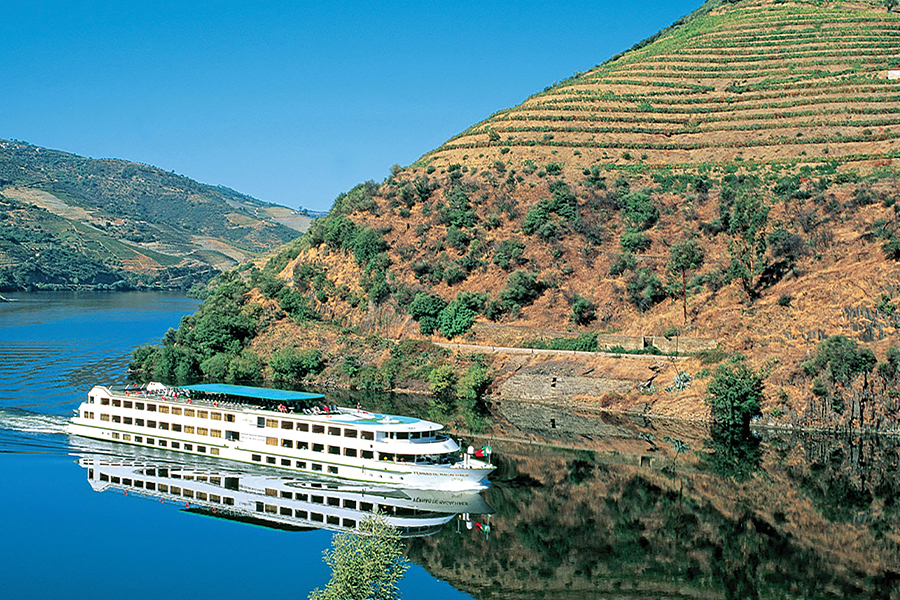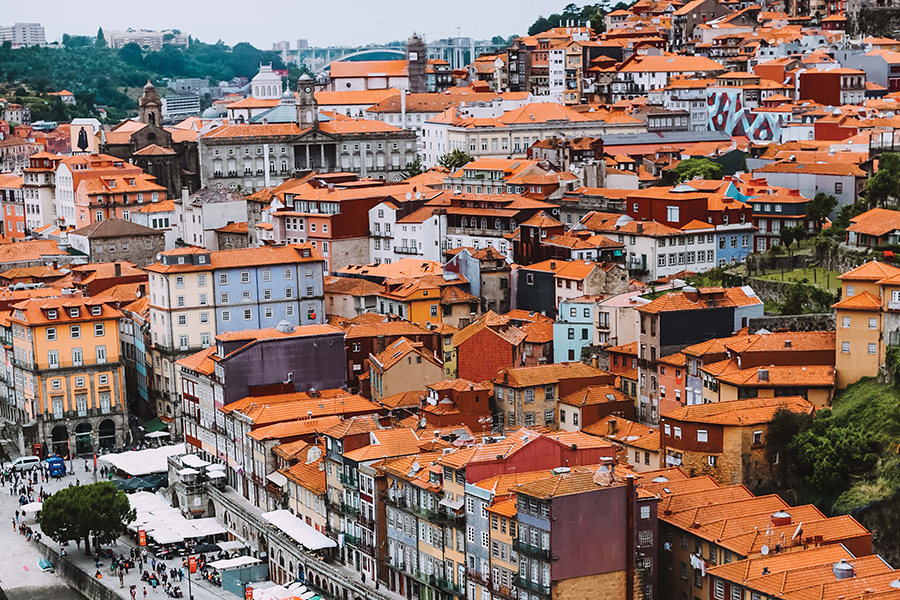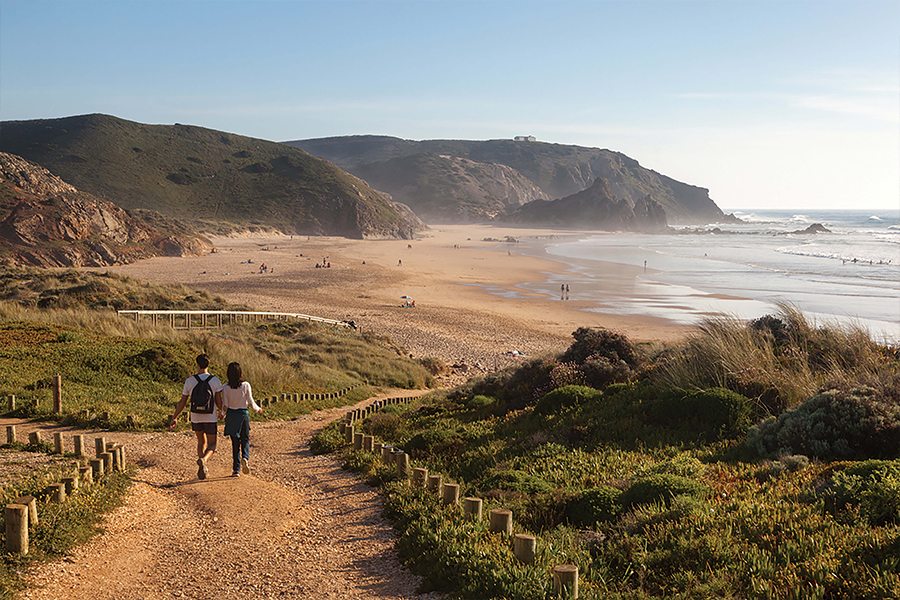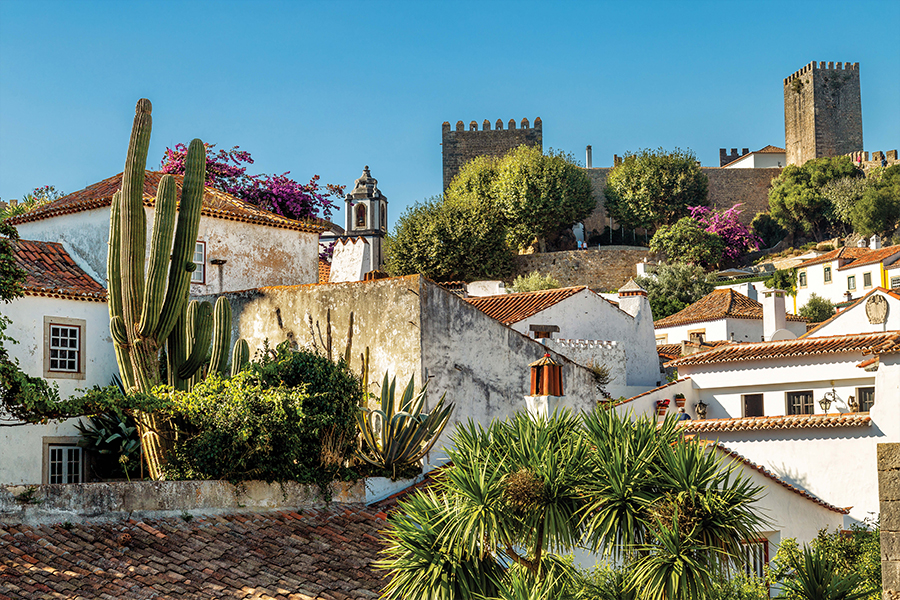Portugal’s New Age of Discovery

With its long shoreline facing what was once vast, uncharted territory, Portugal has always been the perfect setting for exploration. From this small-but-mighty country in the corner of the continent, 15th-century mariners embarked on voyages that changed the world; now modern-day explorers are finding their way back. Portugal’s rich tapestry of history and culture woven over centuries of civilization—as well as a stunning landscape—is the foundation for endless travel possibilities.
River Cruising in Portugal
Sail the Douro River
Portugal’s Douro River is the setting for a 10-day cruise tour unlike anything travelers will find in the rest of Europe. The appetizer is a one-night stay in Lisbon, Portugal’s hilly capital known for pastel-hued 18th-century architecture (much of it built after an earthquake in 1755), maritime history and a lively culture reflecting the city's glorious past. For the main course, travelers continue northbound by luxury motorcoach to Porto, the“city of seven bridges,” famous for the country’s renown export, port wine. A free evening before the start of the seven-night cruise allows time to wander the narrow cobblestone streets of the city center (a UNESCO World Heritage Site) or sample the local specialty in nearby riverfront Port Houses.
From Lisbon to Salamanca
Once on board, guests settle in as the Douro flows gently past olive and almond orchards, quaint villages and steep sun-drenched vineyards. Local excursions are delightful diversions; guests can tour an 18th-century Baroque palace, sample muscatel vintages on a hilltop estate, and in Salamanca, Spain—the turnaround point just over the border—stroll the Plaza Mayor, one of Europe’s loveliest public squares. Post-cruise add-ons are encouraged in Porto and Lisbon and are easy to plan with the help of a travel expert. This is a cruise experience for those who embrace history and architecture, great food and wine and a laid-back tempo with time to savor each experience.

Portugal Guided Vacations
There are more possibilities than ever for group travel, as tour companies continue to diversify, incorporating private tours, customized itineraries for any group size and even wellness directors who monitor health and safety protocols throughout the trip. For an exceptional European cultural experience in under 12 days, AAA travel advisors recommend a guided tour of one country rather than a broad, regional overview. A fine example is the well-balanced 11-day Country Roads of Portugal Tour, offered by AAA.
Tour Coastal Lisbon to the Douro River Valley
The Country Roads of Portugal Tour is a loop that begins and ends in Lisbon, contrasting the fresh salty sea air and cliff-like rock formations and fishing ports on the Atlantic coast, with the lush Douro River Valley in the north, its bounties celebrated in farm-to-table dinners and winery visits. The luxury motorcoach weaves its way from one edge of the country to the other along the central region’s scenic back roads, delivering well-rested travelers to cities and towns brimming with medieval masterpieces. UNESCO World Heritage Sites seem to be around every corner—from the old towns of Evora and Porto and Templar Castle to the Convent of Christ in Tomar and Lisbon’s stunning 16th-century Belém Tower, a limestone fortress perched on the banks of the Tagus River.
A nice feature of this tour is the option to choose between the classic group size (about 32-38 guests) or small group (no more than 24). Either way, it never feels too crowded, and it is always easy to make friends. Plus, solo travelers are welcome. Accommodations are upscale and centrally located with easy access to main attractions, including a five-star stay in the historic district of Porto.

Adventure Travel Across Portugal
Hiking & Cycling Adventures for Active Travelers
Road warriors and back-country hikers have plenty of company along Europe’s alpine trails and rugged shorelines. Active travelers who are willing to let someone else do the planning are finding an impressive array of biking and walking tours in Portugal, reaching back roads and small towns where myriad activities showcase local culture and history. Comfortable accommodations and authentic dining experiences are the norm, and E-bikes—an option for an easier ride—are usually available. A small group size (about 20 guests) and a moderate activity level are big draws, but it’s the guides—traveling storytellers, translators and local experts—who make a lasting impression.
One of the most popular cycling itineraries is a route from Lisbon to the Algarve, Portugal’s sunny southernmost region. To get there, guests pedal through scenic wheat fields and rolling hills of the Alentejo region to the medieval walled city of Evora (another UNESCO World Heritage Site). It’s a highlight of the trip,not just for the canopy of cork oak and olive trees lining the area's two-lane roads but for the artistic and architectural treasures preserved throughout the city and surrounding area.
In the nearby village of Redondo, local artisans welcome curious visitors into the cool interiors of their studios, where they create one-of-a-kind pottery pieces using a technique dating back 500 years. A shuttle-or-ride excursion to the picturesque hilltop village of Monsaraz is rewarded with a splendid view of the Alentejo countryside and Guadiana River on the Spanish plains. One of the oldest settlements in southern Portugal, Monsaraz draws visitors to its centerpiece, a castle originally built as a prehistoric fortification, then reconstructed multiple times over centuries of foreign occupations.

Algarve walking tours make a stop in Evora but devote more time to the dramatic scenery and friendly hospitality of the Atlantic coast, where vacationers recreate on golden beaches sheltered by dramatic rock formations and retreat to boutique hotels featuring spa services and locally sourced meals. Pine and eucalyptus aromas fill the cool air of Serra de Sintra, a stunning coastal mountain range north of Lisbon where medieval royalty once summered in wooded hunting lodges and enchanted hillside castles. Further south, walkers follow the well-preserved Fisherman’s Trail down to whitewashed villages and secluded beaches, keeping an eye out for stork nests hidden on the sandstone cliffs above the ocean. Evenings are often celebrated at a seaside patio, raising a toast to the continent’s final moments of daylight.
In the Azores, Portugal’s archipelago of nine volcanic islands (800 miles to the west) in the Atlantic, thrillseekers can strap on a helmet and harness for a canyoning excursion through the forest and rivers of São Miguel Island or lace up their hiking boots for a trek along Corvo Island’s famous Caldeirão Trail. Light adventure is plentiful, too. Evenings are devoted to the healing properties of thermal pools and afternoons to whale watching and kayaking. There are nature hikes for birdwatchers or wineries and banana plantations for the culturally curious, and even a “Best Viewpoints Tour” for amateur photographers. Getting to the Azores isn’t complicated; nonstop flights are available from New York and cities throughout Europe, and island hopping is quick and easy by air, and cheaper and less convenient by ferry. A good travel advisor can help in the planning process.
Independent Travel in Portugal
Flexibility is important to seasoned travelers who know their way around European cities, but a little customization comes in handy, too. While there’s no reason to discourage free spirits from booking on the fly with a mobile app, travel experts suggest having at least some accommodations prebooked, especially for arrival and departure days. Fumbling around with a map and guidebook on day one, wondering “Where should we go, and what shall we do?” may be exhilarating, but it can be time-consuming.
Here’s the good news—getting around Portugal isn’t complicated. Car rentals are readily available, and roads are excellent. Public transportation is less expensive, and some would argue it is more fun and less stressful. The national railway system, Comboios de Portugal, reaches major cities and towns throughout the country at various comfort levels, from local commuter trains to Alfa Pendular, Portugal’s top-tier, high-speed service. Flexible multiday rail passes are available, too, but it’s wise to compare them to cheap city-to-city fares (a one-way Lisbon to Porto ticket starts at around €20). Trains do not reach every small town, but privately owned bus companies fill in the gaps with modern vehicles and convenient schedules.

Travel advisors can customize the Portugal experience by adding local activities like a walking tour of Evora, wine tasting in Porto or a day trip from Lisbon to Óbidos and Fátima. However, the most sought-after activity is an evening of authentic Fado music. Soulful ballads sung by “fadistas” (Fado singers) tell stories of love, regret, fate and longing in a style that is sometimes improvised—and always delivered with deeply felt emotion. The performance is usually accompanied by a classical and 12-string Portuguese guitar in a small dining establishment, but it can also include a string quartet or full orchestra in a larger venue. It is believed that Fado evolved from Lisbon’s port districts in the early 1800s, entertaining listeners with the tales (and woes) of sailors and the working class with songs influenced by early medieval lyrical poetry, Moorish song and African dance. There are many theories about its origins, but one thing is certain: it is a treasured art form that communicates the very essence of what it is to be Portuguese. A worthwhile discovery indeed.





